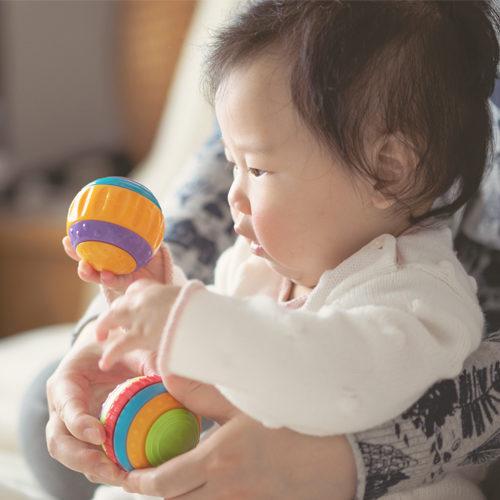Early brain development in a child

The average baby’s brain at birth is about one-quarter of the size of an adult brain. But by the time Your Child is celebrating their first birthday, the brain has doubled in size. By the third birthday, Your Child’s brain has reached about 80% of adult size.
How a child’s brain develops
At birth, a baby has all the brain cells they will ever have in life, but these cells are still growing and making connections with one another. It is these connections that make the brain develop and function — coordinating all the activities in the body. Close to one million new neural connections are made every second during the early childhood period.
Research has shown that a child’s day-to-day experiences are critical in building the necessary brain connections that determine brain development. While positive experiences from interactions with parents, siblings, and caregivers ensure healthy brain development, negative experiences reduce the brain capacity to form the necessary connections needed for proper development.
Factors that influence brain development
There are a lot of factors that can affect a child’s brain development, including the genes inherited from the parents. While nothing much can be done about the genes, there are other factors which we can influence, such as:
- Good nutrition
- A healthy environment
- The child’s experiences
The effects of good nutrition
Proper nutrition is essential for your baby’s brain development both while in your womb and outside the womb. Right from the first week of conception, there are certain nutrients needed for the baby’s brain to develop optimally. One of the essential nutrients for a baby’s brain is folic acid. Other ones are the omega-3 fatty acids, such as docosahexaenoic acid (DHA) and eicosapentaenoic acid (EPA).
While in the womb, the baby gets the nutrients through your blood, and after birth from your breast milk. Subsequently, you must make sure that your baby is getting a highly nutritious diet once you stop breastfeeding or substituting with baby formula.
The effects of the environment
Your baby needs a healthy environment to ensure optimal growth and development. A healthy environment is one that doesn’t expose the baby to toxins or infections — either of which can make the baby sick and delay brain development.
Malaria or dengue fever, for example, can severely damage children under the age of five. If you’re in a malaria-endemic region, make sure that your baby sleeps under a mosquito net. Other common childhood infections can be prevented with vaccines. So, ensure that Your Child is up to date with the immunization schedule.
Lead poisoning, which can cause severe brain retardation, is another big concern, because in some countries lead is still allowed in wall paint. If you suspect that your home is painted with lead-based paint, repaint your home with non-lead paint to protect your child from brain damage.
The role of childhood experiences
A child’s brain is almost like a blank page, on which you can either write a beautiful poem or a terrifying horror story. The experience a child gets from their interactions with you, family members, nannies, teachers, and other caregivers affects not only the speed of brain development but also what forms their reality later in life.
If a child experiences love, safety, and security during that critical period of brain development, they will grow up physically and psychologically strong and live a healthy and successful life. On the other hand, if the child experiences fear, anxiety, and insecurity, they would grow up with a lot of psychological problems, such as timidity, inferiority complex, a lack of self-confidence, insecure attachment to other people and a negative self-image.
Providing the stimulus for proper brain development
Apart from providing Your Child with appropriate nutrition and a healthy environment, there are things you need to do to aid your baby’s brain development:
- Responsive care: Right from birth, children seek to interact with the people around them. In the early stages, the interaction is in the form of smiling, blabbing, or crying, before they learn to talk and communicate their needs later on. Always try to pay attention to them, understand what they are trying to communicate, and respond to their needs. Also, talking back to them is okay. These simple interactions are critical and help the brain to build complex connections and develop faster.
- Challenging tasks: As a child grows, it pays to give them challenging tasks that stimulate their brain to find solutions. Depending on the child’s age, the task can range from playing peek-a-boo or hide-and-seek, to simple puzzles, stacking building blocks, or later solving mathematical quizzes. When the child is struggling with the task, don’t be quick to intervene. A good rule of thumb is, whatever Your Child can do alone, let Your Child try to do alone.
- Reduce screen time: During the first five years of life, most children learn very little through technology, such as mobile games or videos – even if such products claim to be educational. Children need social interaction and hands on experiences for their brains to develop. While screens are highly stimulating to children, they don’t create lasting memories and hence little new connections inside a child’s brain.
Verified:
Dr. Ketsupa Jirakarn (Mental health specialist) (31 March 2021)



